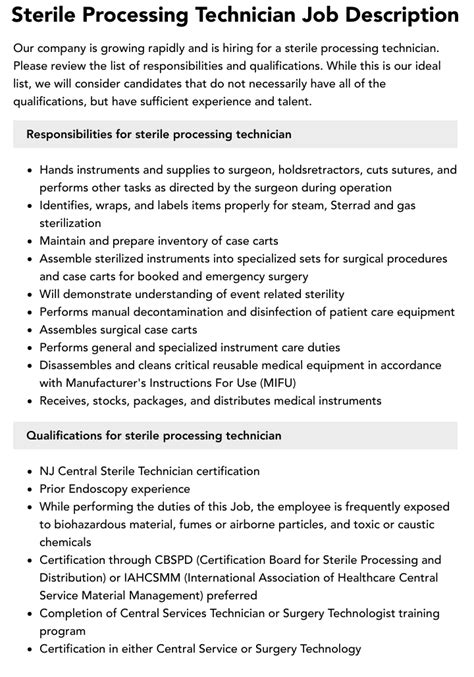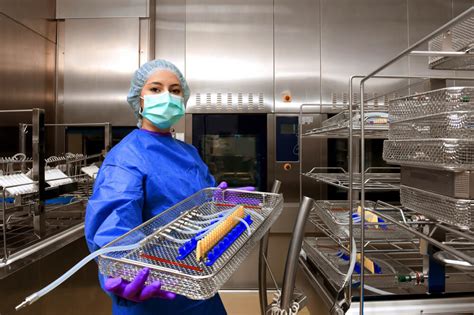Intro
Discover the crucial role of Sterile Processing Technicians in healthcare. Learn how these medical professionals ensure patient safety by sterilizing equipment, managing inventory, and maintaining infection control protocols. Explore the responsibilities, requirements, and benefits of this vital career, and find out why Sterile Processing Technicians are in high demand in hospitals and healthcare facilities.
The healthcare industry relies on a multitude of professionals to provide quality patient care. While doctors and nurses are often the most visible, there are many other essential roles that contribute to the smooth operation of healthcare facilities. One such role is that of a Sterile Processing Technician (SPT). These individuals play a crucial part in ensuring that medical equipment and instruments are properly cleaned, disinfected, and sterilized to prevent the spread of infections.

In this article, we will delve into the world of Sterile Processing Technicians, exploring their responsibilities, the importance of their role, and the benefits of pursuing a career in this field.
What is a Sterile Processing Technician?
A Sterile Processing Technician is a healthcare professional responsible for the cleaning, disinfection, and sterilization of medical equipment and instruments. These individuals work in hospitals, clinics, and other healthcare facilities to ensure that all equipment is properly prepared for use on patients. This includes surgical instruments, medical devices, and other equipment that comes into contact with patients.
Responsibilities of a Sterile Processing Technician
The responsibilities of a Sterile Processing Technician are multifaceted and critical to patient care. Some of the key duties include:
- Cleaning and disinfecting medical equipment and instruments
- Sterilizing equipment using various methods, such as autoclaving or dry heat sterilization
- Inspecting equipment for damage or malfunction
- Packaging and storing sterilized equipment
- Maintaining accurate records of sterilization and equipment maintenance

Why is the Role of a Sterile Processing Technician Important?
The role of a Sterile Processing Technician is vital to patient care and safety. Properly sterilized equipment helps prevent the spread of infections and ensures that patients receive quality care. In fact, according to the Centers for Disease Control and Prevention (CDC), proper sterilization and disinfection of medical equipment is essential to preventing the spread of Healthcare-Associated Infections (HAIs).
Benefits of Pursuing a Career as a Sterile Processing Technician
Pursuing a career as a Sterile Processing Technician offers numerous benefits, including:
- Job stability and growth opportunities
- Competitive salary and benefits
- Opportunities for advancement to leadership roles
- Personal satisfaction of knowing that your work contributes to patient care and safety

Education and Training Requirements
To become a Sterile Processing Technician, one typically needs to complete a training program in sterile processing technology. These programs are usually offered at community colleges or vocational schools and may include coursework in:
- Anatomy and physiology
- Microbiology
- Sterilization and disinfection techniques
- Medical terminology
- Equipment maintenance and repair
Certification and Licensure
While certification is not always required, it is highly recommended for Sterile Processing Technicians. The Certified Registered Central Service Technician (CRCST) certification is offered by the International Association of Healthcare Central Service Materiel Management (IAHCSMM) and demonstrates a level of expertise in sterile processing.

Conclusion
In conclusion, the role of a Sterile Processing Technician is a vital one in the healthcare industry. These individuals play a critical part in ensuring that medical equipment and instruments are properly cleaned, disinfected, and sterilized to prevent the spread of infections. With the increasing demand for healthcare services, the demand for skilled Sterile Processing Technicians is also on the rise. If you are interested in a career in healthcare that offers job stability, growth opportunities, and personal satisfaction, consider pursuing a career as a Sterile Processing Technician.

We encourage you to share your thoughts and experiences in the comments section below. What do you think about the role of a Sterile Processing Technician? Share this article with your friends and family to spread awareness about this vital profession.
What is the average salary of a Sterile Processing Technician?
+The average salary of a Sterile Processing Technician varies depending on location, experience, and employer. However, according to the Bureau of Labor Statistics, the median annual salary for Sterile Processing Technicians is around $44,000.
Do Sterile Processing Technicians need to be certified?
+While certification is not always required, it is highly recommended for Sterile Processing Technicians. The Certified Registered Central Service Technician (CRCST) certification is offered by the International Association of Healthcare Central Service Materiel Management (IAHCSMM) and demonstrates a level of expertise in sterile processing.
What are the working conditions like for Sterile Processing Technicians?
+Sterile Processing Technicians typically work in hospitals, clinics, and other healthcare facilities. They may work in a fast-paced environment and be exposed to chemicals and other hazardous materials. However, most facilities take precautions to ensure a safe working environment.
